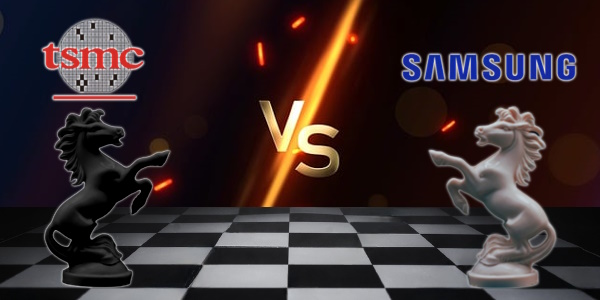
There is a possibility that Samsung Electronics’ foundry (semiconductor consignment production) division will win large-scale orders from Qualcomm again through yield stabilization.
Kyung Kye-hyun, head of DS division and CEO of Samsung Electronics, is expected to tighten the reins to secure ‘big tech’ customers such as AMD and Apple as well as Qualcomm.
According to foreign media reports on the 24th, such as Extreme Tech and Phone Arena, the global IT media, Samsung Electronics achieved a yield of about 60% in the 3-nm foundry process and is on a stabilization track.
PhoneArena said, “Samsung Electronics is known to be showing better yields in the 3-nano process than its competitor, TSMC, and is taking a lead in terms of technology by applying new technologies.
Famous IT tipster (information leaker) Lebegenus made an observation that Qualcomm’s Snapdragon 8 4th generation will be manufactured only in TSMC’s N3E (3-nano process), but a different opinion is spreading recently.
Moreover, while TSMC, the No. 1 in the foundry industry, has recently been slowing down, Samsung Electronics is rapidly stabilizing yields in 3-nano process, and it is understood that there is an atmosphere of weighing TSMC and Samsung Electronics among major big tech customers.
Lisasu, CEO of AMD, said in an interview with Nikkei Asia on the 21st, “We will consider manufacturing capabilities other than TSMC to secure a flexible supply chain.
Lisa Su did not directly mention a specific company in the interview, but there are many views that it is worth noting that Samsung Electronics is the only company with advanced process manufacturing technology except for TSMC. In order to secure Samsung Electronics’ foundry customers, Kyung Kye-hyun has been working hard on technology advancement, such as continuously expanding design assets (IP) and increasing yield, and it is expected that he will be able to reap results sooner or later.
In a recent lecture at Yonsei University, President Kyung pointed out that the foundry business is similar to the hotel business in that it must meet the requirements of customers with high yields, and said, “We are speeding up the development of 3-nano and 2-nano technology so that we can attract other customers without losing existing customers.”

Samsung Electronics succeeded in mass-producing 3-nano process semiconductors for the first time in the world by introducing a new technology, Gate All Around (GAA), ahead of TSMC last year.
Gate All Around (GAA) is a technology in which the channel through which current flows in a transistor, a semiconductor component, and the gate that controls it are in contact with each other on all four sides.
Gate control is more strengthened than the existing ‘FinFET’ method, where the channel and gate contact surfaces are limited to three surfaces, so not only performance is improved while consuming less power, but also the leakage current problem can be solved.
As of the first half of 2023, Taiwan’s TSMC is still applying the existing FinFET method in the 3-nano process, and it is said that it is having difficulty catching the yield.
According to foreign media such as global IT media Anandtech and Extremetech, the yield of Samsung Electronics’ 4nm process is estimated to be over 75% and that of 3nm is over 60%, whereas TSMC’s 3nm process yield is still estimated to be around 55%.
If Samsung Electronics maintains its lead over TSMC in 3-nano process yield, it is expected that it will be able to provide an opportunity to expand its customer base to Qualcomm and AMD Big Tech customers in the future.
In particular, as the new high-tech GAA is applied in the 3-nano process, if production stability is secured, it seems that it will be able to meet the opposite situation of being undervalued in terms of technology compared to TSMC after the chip gate related to Apple’s mobile chip (AP) in the past.
Chipgate was an incident that occurred in 2017 due to suspicions that the iPhone 6S had differences in specifications such as battery duration for each device.
Many media and users claimed that there is a difference in performance depending on whether the processor manufacturer is Samsung Electronics or TSMC. In conclusion, as a result of an external investigation, there was no difference in the performance of the two types of iPhones, but after Chipgate, Samsung Electronics lost its huge customer, Apple.
Unlike then, as Samsung Electronics is now ahead in terms of yield and transistor technology, it means that it has more room to regain big tech customers that were lost to TSMC such as Qualcomm and Apple.
Kim Dong-won, a researcher at KB Securities, said, “The yield of Samsung Electronics’ foundry division is estimated to show a significant improvement compared to the previous year.
Park Sang-wook, a researcher at HI Investment & Securities, also said, “Samsung Electronics is the only foundry company that has succeeded in consignment production of semiconductors based on GAA technology and is rapidly improving the yield of 3-5 nanometer foundries.”
